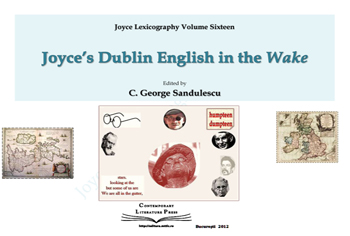C. George Sandulescu (editor)
Joyce’s Dublin English in the Wake
 | Please click on the link below and choose "Save file" to download the book in .pdf format C. George Sandulescu (editor) Vol. 16. Joyce’s Dublin English in the Wake | |
| Forty days ago — to the day — The Times Literary Supplement issued a Finnegans Wake word-discussion of exactly the kind we are doing here in this lexicographic series. That gives us a lot of courage to continue. Volume Sixteen of the series James Joyce Lexicography deals with a special kind of language: it is a language that has posited many problems, both linguistic and social, on the one hand, and downright political, on the other hand. That part of the book which the present volume reprocesses in fairly great detail deals with the kind of English which was being spoken in Dublin, the capital of the Republic of Ireland, in the seventeen years during which the author James Joyce was working on the book. By a more than strange coincidence, Joyce started working on Finnegans Wake the very year Ireland broke away from the British Empire, and became an independent republic. And, by another strange coincidence, author Joyce finished the book the very year the Second World War started, with Germany invading Poland on the orders of Adolf Hitler on 1 September 1939. In consequence of all this, it is not possible to say that the population of Dublin was speaking, and implicitly still speaks, an “Anglo-Irish Dialect.” That is why, the title of this book is a more direct way of putting across to the wide public the kind of language spoken in the Irish capital without getting entangled with political implications. In addition, the book is open-ended. Many Dublin residents going through it may find new things, or alternatively, disagree with some statements made in the book. You must bear in mind that Joyce was genuinely and truly being exposed to Dublin English as far back as 120 years ago! For better or for worse, James Joyce was a Dubliner to the marrow of his bones, having only been exposed to Dublin English for the first twenty years of his life. The rest of his time — in Paris, and Trieste, and Zurich — the Irish spoken in Dublin by all the characters in Finnegans Wake was only recollection of childhood and the linguistic nostalgia of a teenager. Take it or leave it for what it is. All our thanks go to Richard Wall, and his excellent attempt to pencil down the almost impossible.
29 November 2012
Please click on the link below and choose "Save file" to download the book in .pdf format C. George SandulescuVol. 16. Joyce’s Dublin English in the Wake
Cu exact patruzeci de zile în urmă, ziarul The Times Literary Supplement a publicat un articol despre un singur cuvânt din Finnegans Wake. Articolul analiza cuvântul grecesc mavro exact în maniera în care textul lui Joyce este studiat de întreaga serie lexicografică publicată de Contemporary Literature Press. Aceasta ne dă mai mult curaj să continuăm. Al șaisprezecelea volum al seriei noastre, James Joyce Lexicography, se ocupă de o formă specială a limbii engleze, extrem de importantă pentru Joyce, formă care ridică probleme majore, atât lingvistice și sociale, cât și — mai ales — politice. Am ales din volumul lui Richard Wall doar partea care se ocupa de limba engleză vorbită în Dublin, capitala Republicii Irlanda, în perioada celor șaptesprezece ani cât a lucrat James Joyce la Finnegans Wake. Am extins mult și am prelucrat după principii pur lexicografice textul inițial al lui Wall. Joyce a început să scrie Finnegans Wake în anul în care Irlanda și-a câștigat cu greu independența, separându-se de Imperiul Britanic și devenind o republică de sine stătătoare. În momentul în care James Joyce a terminat de scris cartea, a izbucnit, în același an, al doilea război mondial: la 1 septembrie 1939 Adolf Hitler a dat ordinul Germaniei să invadeze Polonia. Drept urmare, nu se poate spune că la Dublin se vorbea, și se vorbește, un “dialect anglo-irlandez”! Titlul acestui volum pe care îl publicăm acum încearcă să caracterizeze felul de a vorbi engleza în capitala irlandeză, fără a intra în definiții ce țin mai mult de politică. Cartea aceasta rămâne în mai multe sensuri “deschisă”: locuitorii orașului Dublin vor avea fără îndoială multe de adăugat, și poate că nu vor fi de acord cu unele afirmații. Să nu uităm însă că Joyce a învățat limba engleză așa cum se vorbea ea la Dublin cu 120 de ani în urmă! Cu toate acestea, James Joyce a rămas în sufletul lui locuitor al acelui oraș tot restul vieții sale. Engleza pe care a cunoscut-o el reprezintă tot ce ceea ce a învățat în primii douăzeci de ani din viață, întrucât a părăsit Irlanda definitiv la vârsta de numai douăzeci de ani! Tot restul vieții sale — fie că a locuit la Paris, Trieste ori Zürich — a recreat irlandeza vorbită la Dublin, punându-și personajele din Finnegans Wake să rostească expresii învățate în primii lui ani de viață. Se simte peste tot nostalgia lingvistică a adolescentului. Engleza lui locală vorbită era, cu alte cuvinte, pură amintire. Cu atât mai mare este meritul lui Richard Wall de a fi încercat cu deosebită pricepere să surprindă ceea ce era de fapt aproape imposibil de surprins: îi mulțumim din inimă pentru tot ce a făcut.
29 November 2012
| ||
Please click on the link below and choose "Save file" to download the book in .pdf format
C. George SandulescuVol. 16. Joyce’s Dublin English in the Wake
